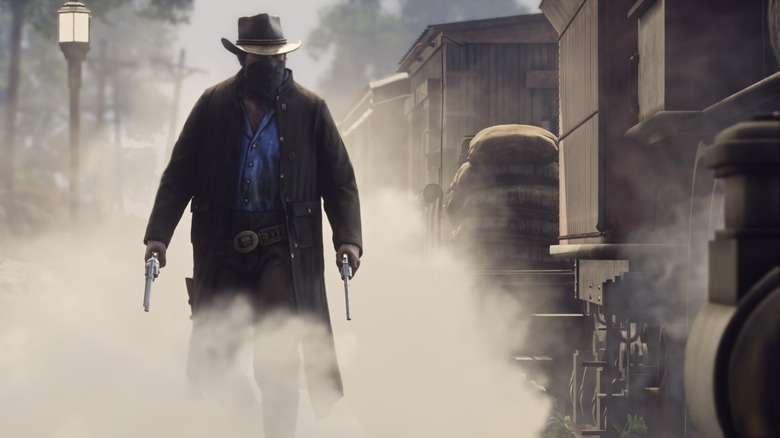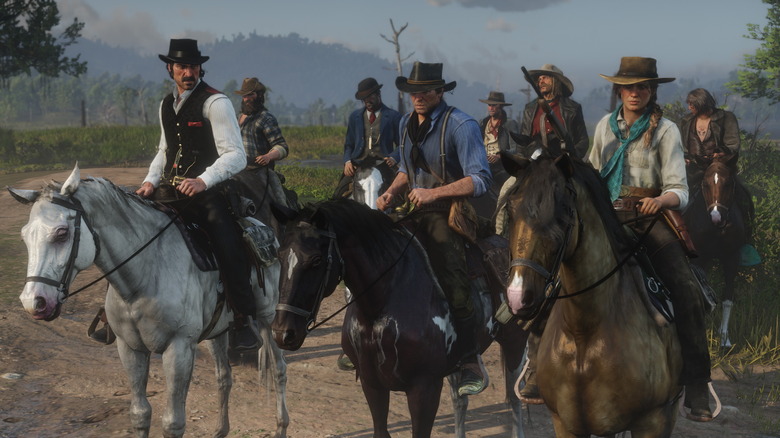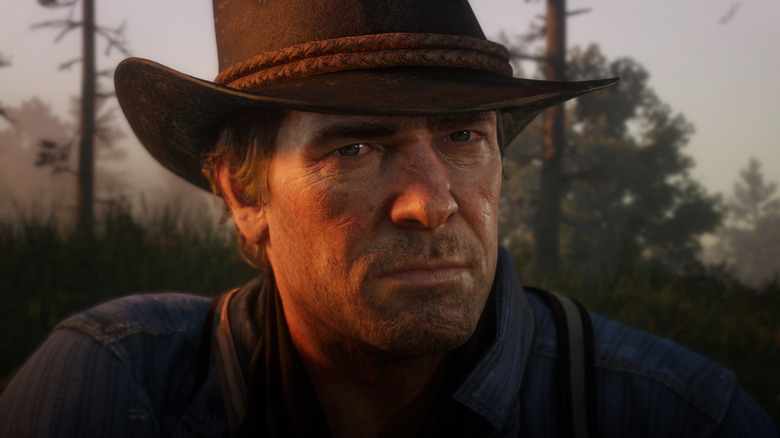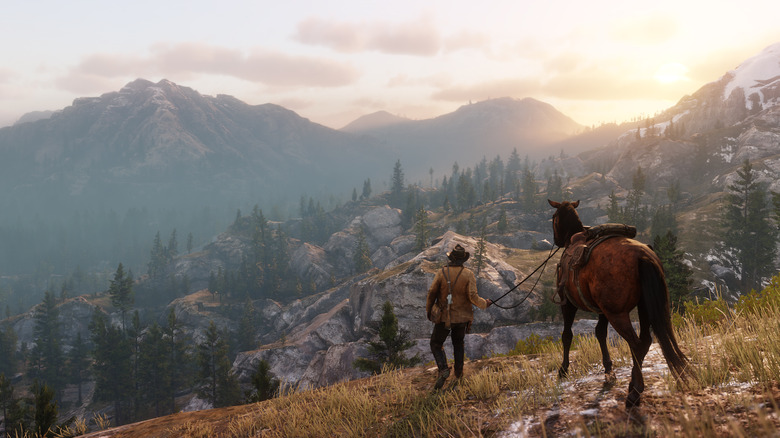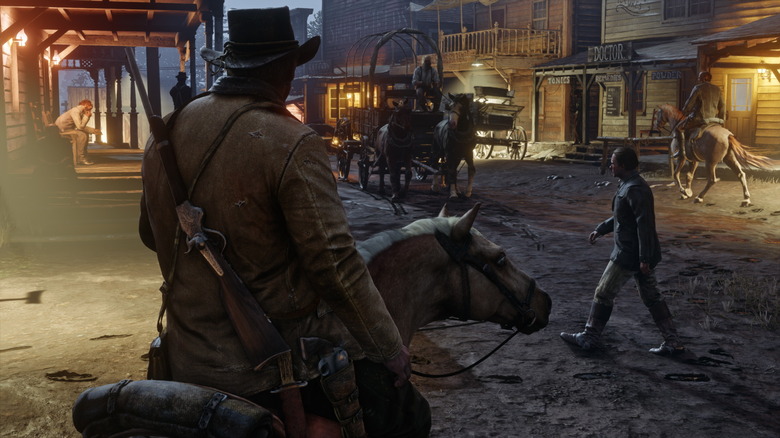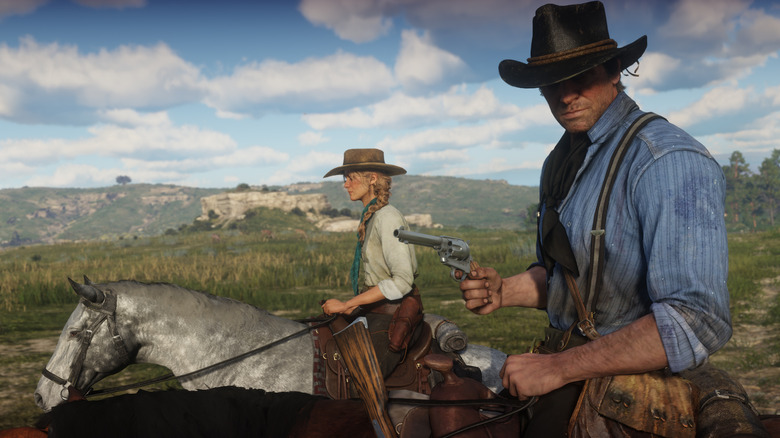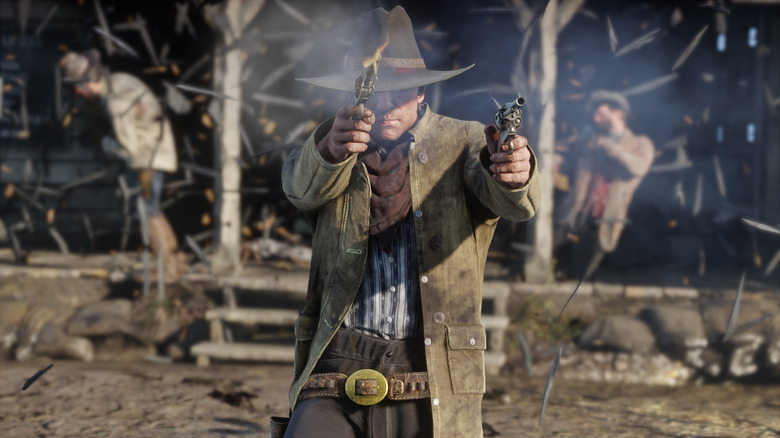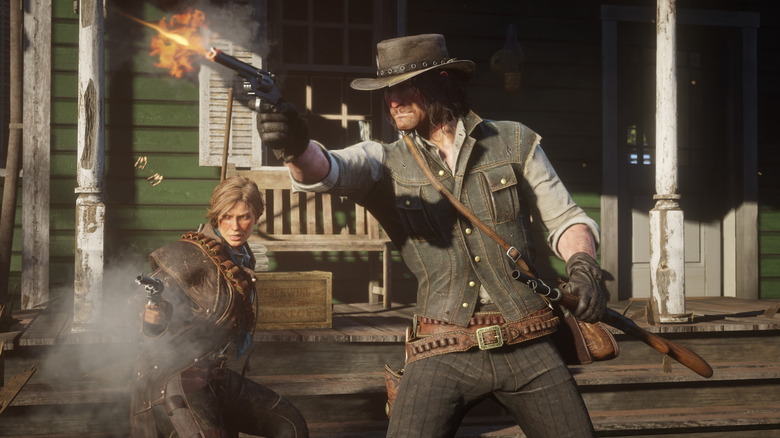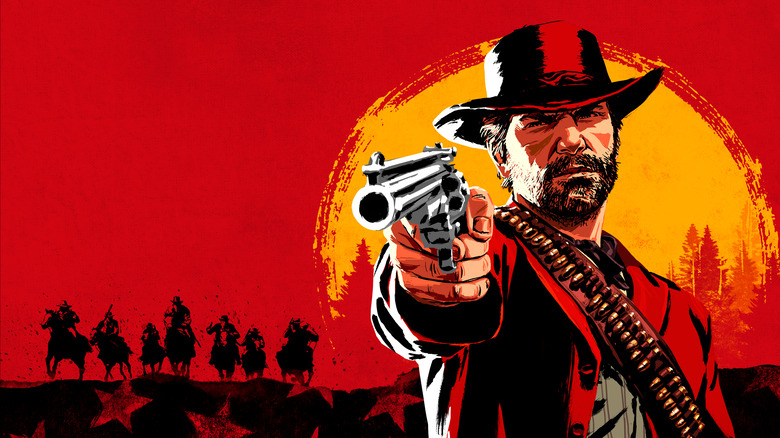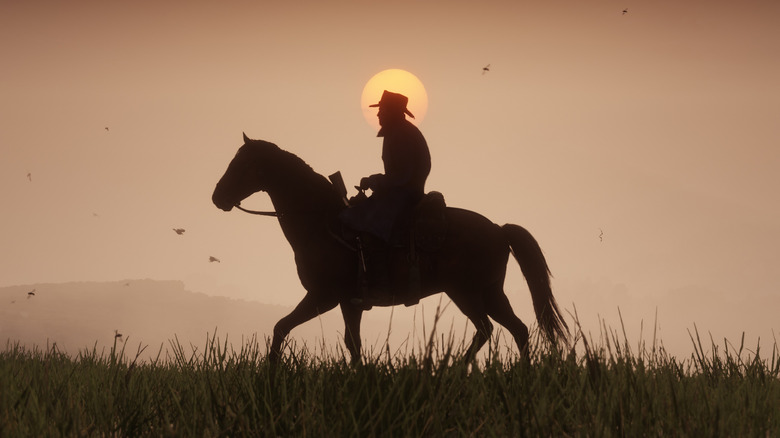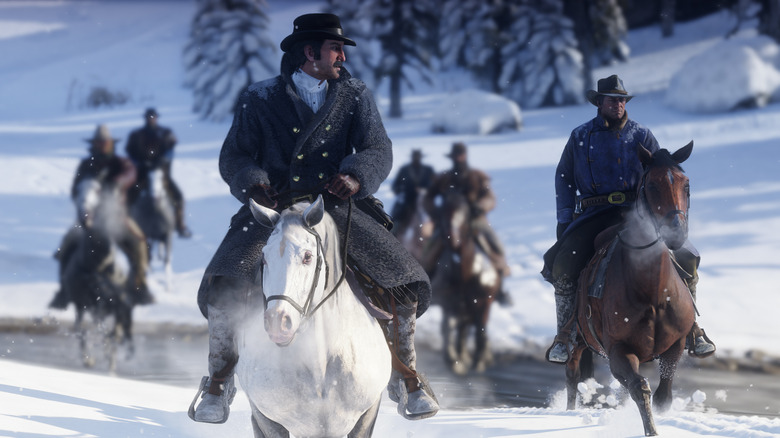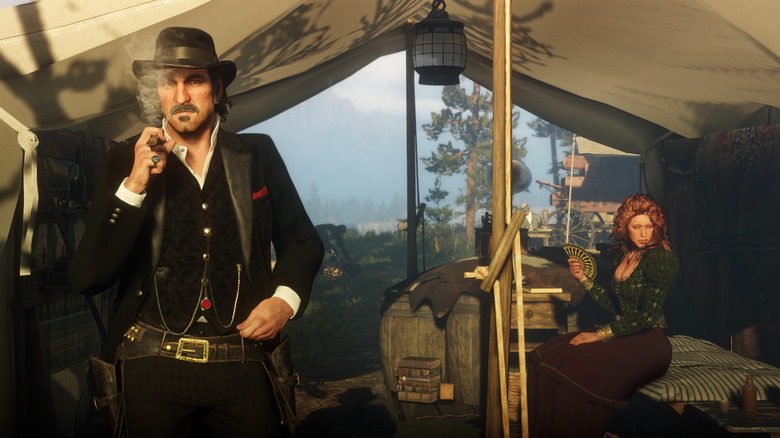Dumb Things Everyone Ignores About Red Dead Redemption 2
Before we dive in, let's make one thing perfectly clear: Red Dead Redemption 2 stands as a landmark achievement for Rockstar. The game set a new standard for immersive, open-world gameplay, and its narrative blossoms into a memorable climax that lingers in your head for hours. From the first few forays into the snowy wilderness to the tense final hours of the epilogue, this cowboy adventure delivers on multiple levels.
But it's impossible to say Red Dead Redemption 2 is a perfect game. Despite the rave reviews and nearly universal praise, parts of the game fail to hold up under close examination. Often times, the open-world game mechanics don't necessarily mesh well with the heavily driven narrative. Some plot points don't make sense, while other aspects are just plain dumb.
Fair warning: if you haven't beaten the main story yet, we're going to spoil some critical plot points. Arthur's journey through the Wild West may be full of fun, exciting moments, but it's also full of some questionable decisions. So let's take a look at some of the dumb things in Red Dead Redemption 2 that you probably ignored.
Allegedly contagious
Early in Chapter 2, Arthur shakes down a poor, sick fellow named Thomas Downes, beating him within an inch of his life. This, of course, comes back to haunt Arthur, as he shows symptoms of tuberculosis in Chapter 6.
It makes sense that Arthur contracted such a deadly disease. Tuberculosis is an incredibly contagious airborne disease. When someone with tuberculosis so much as coughs or even speaks, they put everyone around them at risk of infection. For Arthur, the symptoms didn't show until some time later, and after that moment, he became a walking, talking infecting machine.
So why didn't anyone else in Dutch's gang get tuberculosis? Hygiene never seemed like a priority in camp, and Arthur didn't exactly quarantine himself. From rescuing John in Sisika to saving Eagle Flies from Fort Wallace, Arthur did his fair share of talking and coughing around people. Even Micah, who fought Arthur in his final moments, didn't contract the disease, as evidenced in the epilogue. A vaccine wasn't found until 1921, more than two decades after Arthur passes. While we're glad no one else had to suffer the deadly disease, it's a little fishy that only Arthur contracted tuberculosis.
Arthur Moneybags Morgan
From the start of Red Dead Redemption 2, Dutch van der Linde has his sights set on one thing: money. He always has a plan, and that plan always leads to cash. Once the gang has enough, they'll all make the trek out west, where he promises a better life for everyone. You can say a lot of things about Dutch, but you can't deny his charisma. He rallied this group of outlaws, bringing them together under one common banner while making sure everyone was on the same page.
So why does it seem like Arthur is the only one donating a substantial amount of money to the camp? Nothing gets upgraded without Arthur footing a majority the bill, and that includes Dutch's sleeping quarters. Granted, he's a capable cowboy, and he isn't Dutch's right-hand man no reason. But what about John, Javier, or Lenny? They're all as capable as Arthur (John especially so, since you play as him in the epilogue). Yet, it seems like Arthur is the only one able to make real money moves. Could you imagine how much better camp life would be if everyone produced even half as much as you did?
Was that Arthur or the wind whistling?
Much like Grand Theft Auto 5 is impossible to play without cars, you would be lost in Red Dead Redemption 2 without your trusty horse. The open world is massive and would take forever to journey across on foot, but on horseback, it's less of a chore. Needless to say, without your trusty steed, you're out of luck.
Of course, you can call your horse by whistling to them, which brings them running to you. However, for the sake of realism, this nifty trick only works when the horse is within earshot. Considering how much this game asks you to wander off the beaten path and explore, you'll likely find yourself in situations where your horse is nowhere to be found.
Sure, when you consider how immersive and realistic Red Dead Redemption 2 is, it makes sense that your horse wouldn't hear you from far away. But after a while, getting around on foot gets old. This is still a video game, after all. Why not do things like The Witcher 3 or Assassin's Creed: Odyssey do, where whistling spawns your horse, no matter what? Arthur's the one living in 1899, not us.
Looting steals their money and your time
Arthur kills a lot of people in Red Dead Redemption 2, and these people often kept valuables in their pockets. Considering his status as an outlaw cowboy, no one would blame him for rifling through their pockets. It's an easy (and sociopathic) way to make some cash, which the gang constantly needs more of.
But as a player, it quickly becomes hard to justify looting the dead. Moral quandaries aside, the time it takes to steal a dead man's money is ridiculous. Arthur realistically pats down every single pocket, checking every nook and cranny for that last penny. While that makes sense for immersive purposes, it's another example of realism taking over convenience.
RDR2 is first and foremost a video game. More often than not, story missions will leave you with a pile of enemies to scavenge from. But considering that could take up to five boring minutes for some scant rewards, it just makes more sense to move on with the game. You'll probably make more money doing so, anyway.
Fast travel is a one-way street
In open-world games, fast travel has become the norm. Through the power of video game magic, we can bring up a map, point to a location, and end up exactly where we want to be, or at least close to it. It's a convenient little mechanic that saves players time and effort.
Red Dead Redemption 2, being an open-world game, has fast travel. Unfortunately, it's not as fleshed out as most would expect. For one, players need to unlock it at camp first. Then from Arthur's bunk, he can look at a map and travel to any major town he's already been to. You can't see these locations in the context of a map, so you'll have to memorize where these towns actually are, which is dumb in and of itself.
It gets dumber, though. After you travel to that town, you can't fast travel back to camp, let alone to other locations. The closest approximation to "fast travel" would be using stagecoaches or trains, which are limited networks. You could set a waypoint back to camp and set your horse on autopilot, but that's still valuable time that you're wasting.
Gameplay doesn't quite fit Arthur's diagnosis
Often, it takes a bit of time for tuberculosis to develop, depending on a person's immune system. However, the open-world nature of Red Dead Redemption 2 can theoretically poke a hole in Arthur's diagnosis.
After beating Downes and getting infected, you could play the game by focusing on everything but the story. The game offers you a laundry list of activities to do outside the main narrative. In theory, your version of Arthur could spend weeks, months, even years living a happy life full of fishing, robbing, gambling, and hunting without ever showing signs of TB. He doesn't start coughing up blood until Chapter 6, after all.
With that in mind, the disease's development inside Arthur doesn't feel natural. Instead, the sudden showing of symptoms feels more like a convenient plot device to orchestrate a meaningful ending. Depending on how you play, Arthur could possibly never die of tuberculosis, despite the fact that he's infected with it early in the game. The moral of the story is to never get to Chapter 6 so Arthur can live as a free, healthy cowboy in your rendition of Red Dead Redemption 2.
Arthur's meaningless sacrifice
Arthur's story can end in many different ways, depending on your honor level and narrative choices. One of these choices involves saving John, ensuring a future for him and his family. The cost? Arthur's life. Granted, extenuating circumstances — like tuberculosis — made him a dead man walking anyway. But it's the thought that counts, right?
In the epilogue, it's clear how much John cherishes his friend's sacrifice. He uses Arthur's satchel, and he pens entries in Arthur's journal, often emulating the fallen cowboy's drawings. John expresses his sentimentality by metaphorically carrying Arthur with him, even several years later.
But fast-forward to 1911, 12 years after Arthur's passing. We're at the events of the original Red Dead Redemption, and John doesn't mention Arthur once. Keep in mind, he hunts down the remainders of the Van der Linde gang, all of whom knew our hero in the second game. When he confronts Dutch, neither of them bring up the gang's once-important muscleman.
Sure, this could be chalked up to the fact that Red Dead Redemption came out years before its prequel. However, the huge impact Arthur had on John's life seems a little misguided in retrospect.
Player choice versus narrative needs
Let's examine a hypothetical scenario. A cowboy named Arthur Morgan walks down the streets of Valentine. He warmly greets every stranger he passes by, and he even gives some money to a poor beggar. When he's out riding his horse, he helps out every man or woman in need. In fact, he's saved the same stranger multiple times from snake venom! By all accounts, this version of Arthur is an honorable, stand-up citizen.
But then he robs a train and murders countless lawmen. After that, he trots to Strawberry, rescues a fugitive, and slaughters the town. While Red Dead Redemption 2 offers a lot of player agency from the start, in most cases, none of it matters. Whether Arthur chooses to be an honorable person or a dishonorable scumbag, he still commits terrible sins because the story dictates it. It makes the player's choices feel somewhat worthless. At the end of the day, it's all about what the narrative needs, and if it needs our cowboy to murder half a town, so be it.
Your horse has bottomless satchels
Across a couple dozen hours, you'll collect hundreds if not thousands of interesting things. From cans of food to legendary animal hides, Arthur does his fair share of exploring the Wild West. In his travels, he amasses a respectable collection of weapons, including rare signature ones. Some seem more like novelties than actual equipment, like a broken pirate sword or a viking hatchet. Some firearms, like Flaco's Revolver or Midnight's Pistol, can be collected off the bodies of legendary gunslingers. Long story short, you'll have a lot of these the further you go into the game.
Here's the good news: your horse's saddles can carry all of these weapons. The bad news? You have to constantly sort through them. If you want to switch out your repeater for a shotgun, you'll have to scroll through a ludicrous number of filler weapons just to reach it. If you want to pull a specific melee weapon out, good luck finding it in that pile of antiquities. You can't organize your overall inventory, and that lack of control leads to a messy user interface. The problem would be easily solved by letting you stash unwanted weapons at camp.
So that's why we need more money
Dutch van der Linde is a man who lusts for money. He can't have enough of it, and he spends nearly every breath talking about how to get more. It wouldn't be a stretch to say that he likely keeps a close eye on how the camp spends money, making sure none of it goes to waste. So how come Dutch lets Leopold Strauss hang around camp?
Strauss is the sole reason you're forced to make intimidating house calls on more than a handful of borrowers. He clearly loans money out to people who are down on their luck, showcasing classic signs of a predatory loan shark. However, these people also present a high risk for Strauss and, by extension, the camp's finances. After all, what guarantee does he have that these people will pay him back?
And therein lies the problem. If Dutch felt the camp was strapped for cash, why would he want Strauss to lend some to people who might never pay it back? It's an unsound investment that doesn't make sense. That money would be better spent on the camp so Arthur can unlock fast travel sooner.
Is Dutch a vampire?
Red Dead Redemption 2 tells Dutch van der Linde's story as much as Arthur's. His descent into mad paranoia plays a central role in the overarching narrative, and it's made all the more tragic when it sours his relationship with his figurative son. He and Hosea raised Arthur, and the trio was the impetus for the Van der Linde gang.
But have you ever stopped to consider the way Dutch looks, especially in relation Hosea? Hosea fits the bill as a "father" to Arthur, considering his gray hairs and complexion. Dutch, on the other hand, has naught a single gray hair on his head. Even in the epilogue, after several years passed, he still looks younger than Hosea, despite his more grizzled appearance.
It all breaks down in the original Red Dead Redemption. John confronts Dutch various times in the game, and keep in mind, these events take place a whopping 12 years after Arthur died. We wouldn't blame him for growing a few gray hairs. Yet, he still looks younger than Hosea. We're not saying Dutch could be a vampire, but he wouldn't be the first in the game.

